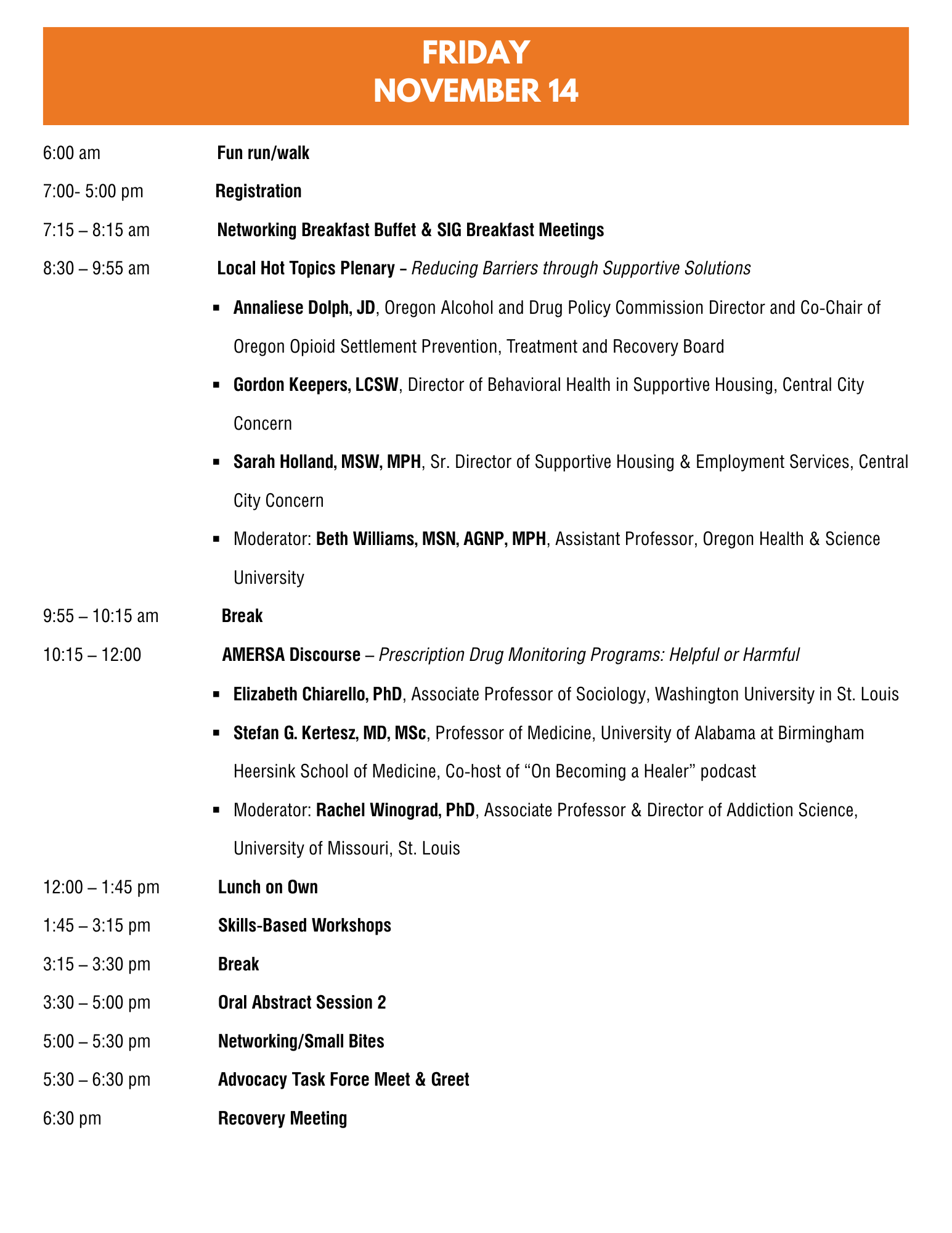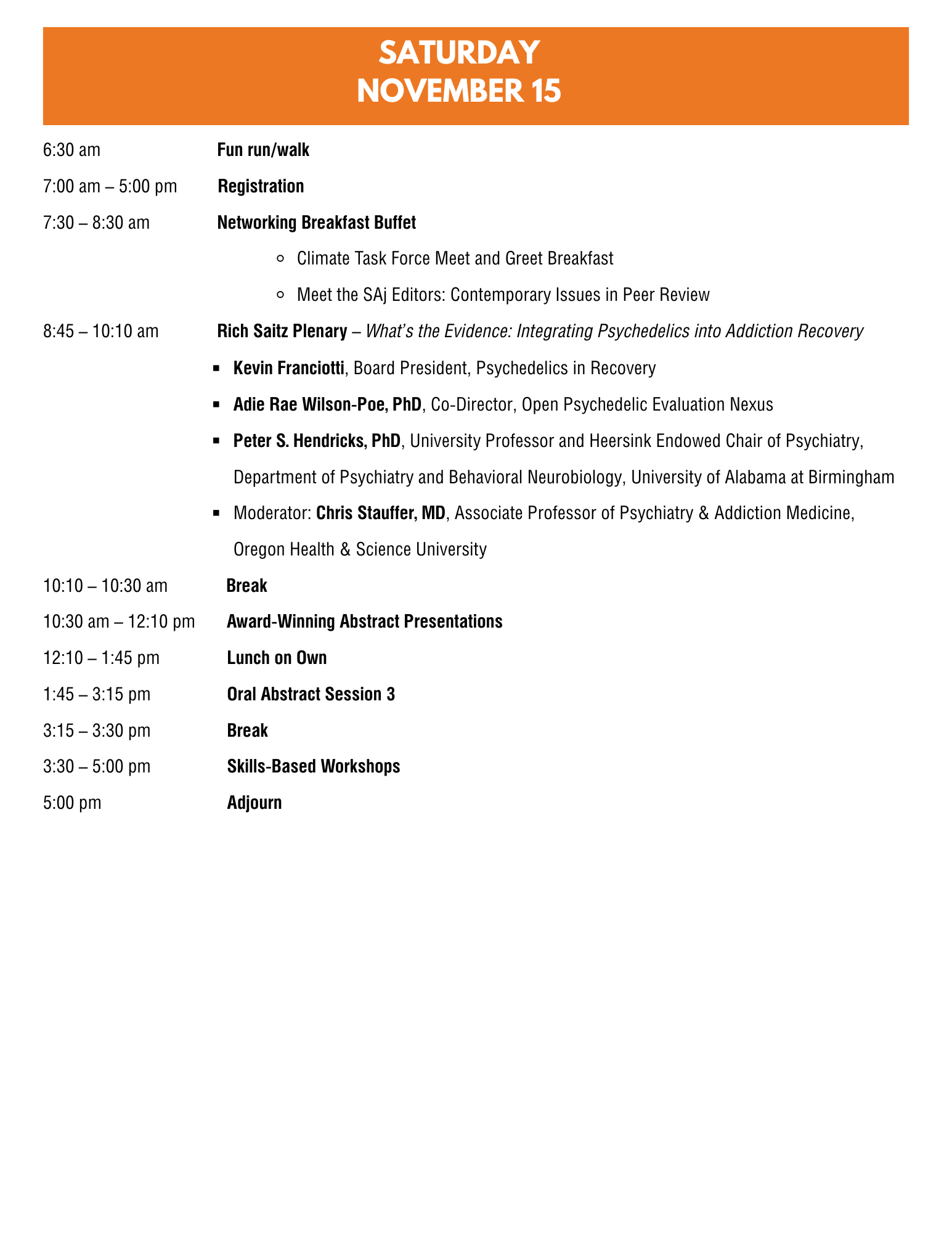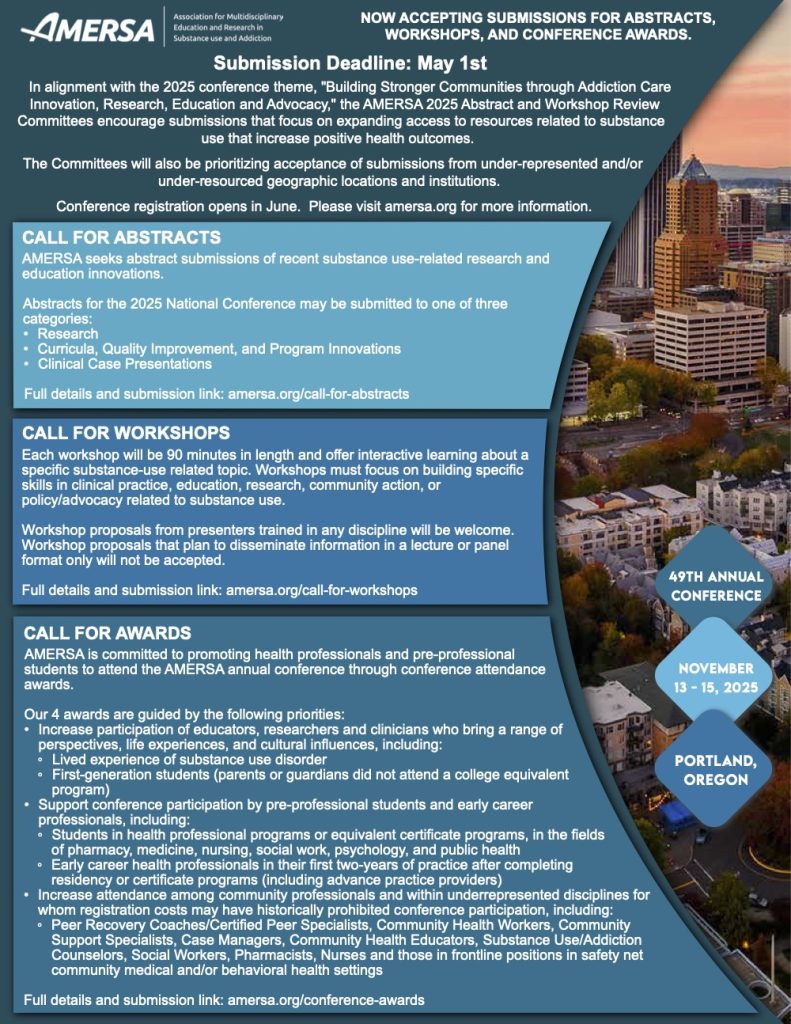
Registration for AMERSA’s 49th Annual National Conference November 13-15 in Portland, OR is now open!
Read the Policy and Procedures for AMERSA events here.
Please read AMERSA’s Code of Conduct for AMERSA events.
CONFERENCE
HIGHLIGHTS
Full conference attendees are eligible for up to 16.75 CE/CME/IPCE credits with purchase of credits. Pre-conference attendees are eligible for up to an additional 4 credits, included in the cost of the pre-conference registration.
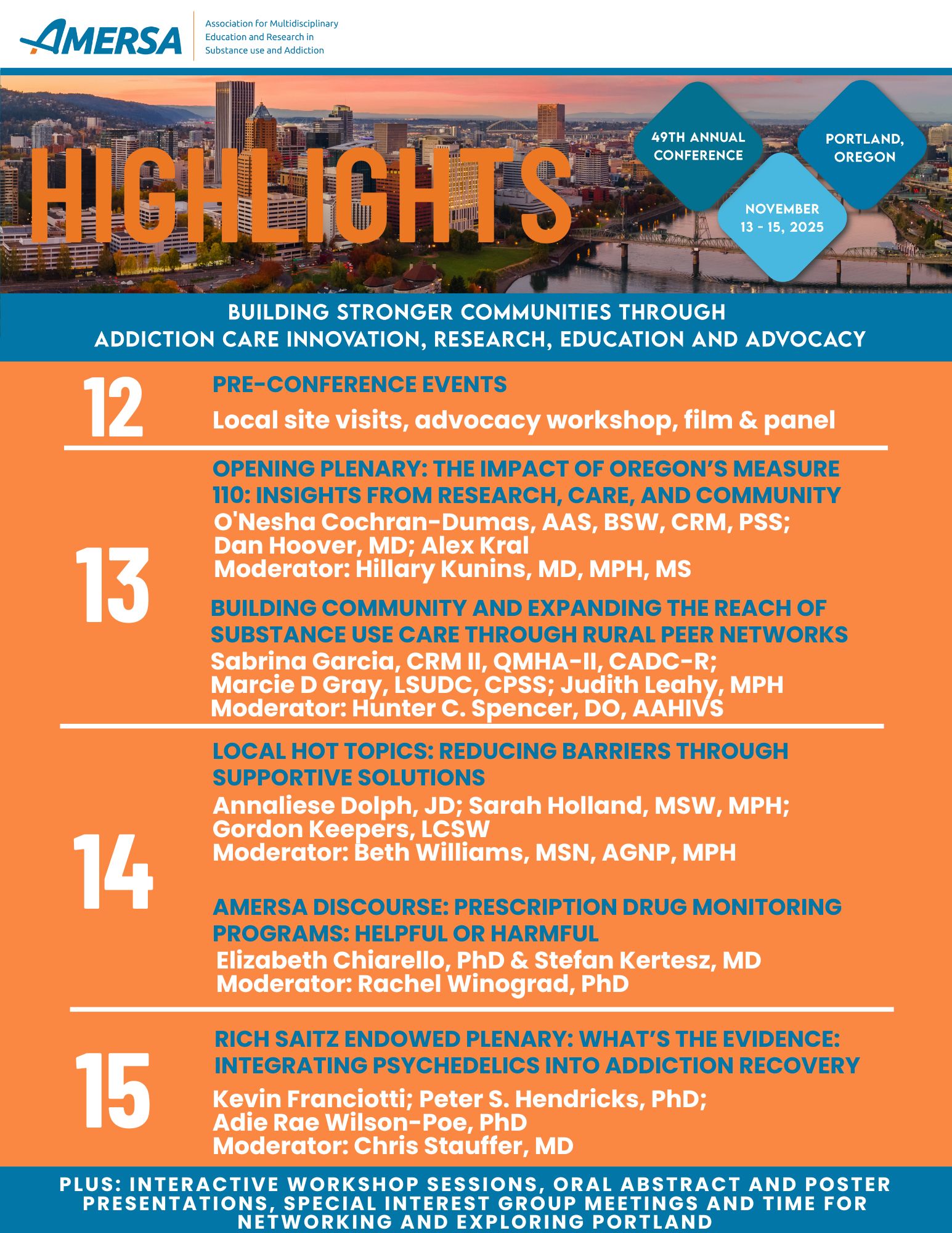
CONFERENCE
SCHEDULE
CONFERENCE
FEES
2025 Conference Fees
AMERSA’s 49th Annual National Conference will be held in Portland, OR November 13-15, with pre-conference taking place on November 12th.
Register by August 31, 2025 for the early bird rates below. On September 1st, 2025 all fees will increase by $50
| Full Conference – Member | $735 |
| Full Conference – Non-member | $845 |
| One Day Attendee | $575 |
| Full Conference plus 1st TIME full membership (Includes a 1-year full membership for NEW members – a $325 value. Learn about AMERSA membership | $935 |
| Sponsored 1st Time Attendee For new conference attendees referred by an AMERSA member. Includes a 1-year full membership – a $325 value. Learn about AMERSA membership | $735 |
| Non-sponsored 1st Time Attendee | $785 |
| Full Conference – Post doc/Resident/Fellow | $650 |
| Full Conference – Student Proof of enrollment required | $475 |
| Community Health Professional Eligible registrants include Peer Recovery Coaches/Certified Peer Specialists, Community Health Workers, Community Support Specialists, Case Managers, Community Health Educators, Peer Navigators and others in similar frontline positions in safety net community medical and/or behavioral health settings | $500 |
| Award Winner, Speaker, Moderator | $0 |
PRE-CONFERENCE
EVENTS
Wednesday, November 12
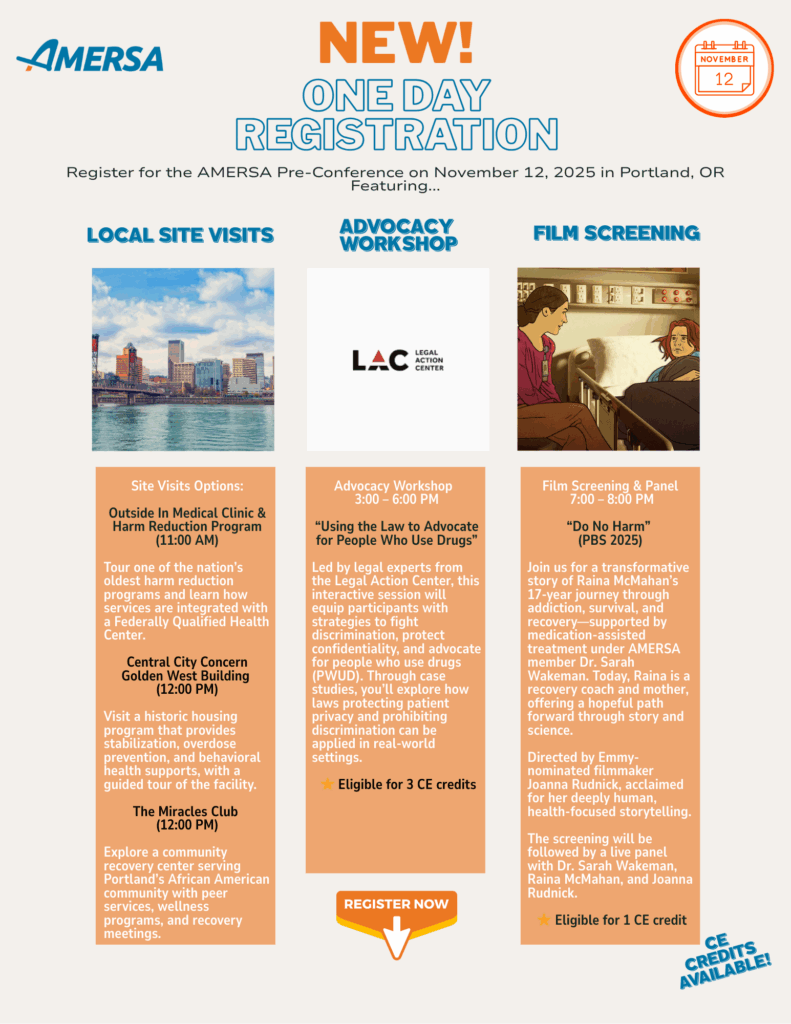
More information:
The Wednesday pre-conference $100 registration fee includes up to 4 additional optional CE/CME credits.
Local Site Visits, Time: 12:00 – 2:00pm
Pre-conference registrants can choose to visit one of the local sites below to learn about the services offered.
Central City Concern Golden West Building: Stabilization Housing with Community Engagement Program, Overdose Prevention, and Street Outreach
The Golden West is a five-story historic building located in the Old Town neighborhood of NW Portland, consisting of 73 single-room occupancy units. Most of the units in the building are supported by CCC re-entry or behavioral health programs, and they serve a vital role in providing rapid, low barrier housing to some of the area’s most vulnerable adults. CCC operates a behavioral health clinic in the adjoining office space to aid in integration of low barrier supports and treatment. Join program leaders as they discuss program design, funding models, and outcomes. After the presentation, they will take the group on a tour of the building.
The Miracles Club
The Miracles Club is a community recovery center that offers addiction peer services to the African American Community, a fellowship hall, a wellness program, events, and meeting space for community recovery meetings. Participants will receive a tour of the space and overview of services offered.
Outside In Medical Clinic and Harm Reduction Program (Note: site visit will begin at 11:00am)
Outside In is a Federally Qualified Health Care Clinic that is also one of the nation’s oldest harm reduction programs. Participants will get a walk through of the clinic before walking about a block away to the harm reduction program site. Program leaders will answer questions about how they integrate the harm reduction program into services.
Interactive Advocacy Workshop, Time: 3:00 – 6:00pm
“Using the Law to Advocate for People who Use Drugs” led by Rebekah Joab, JD, Deputy Director of Litigation and Legal Services & Jacqueline Seitz, JD, Deputy Director of Health Privacy, Legal Action Center
This workshop will be an interactive session that covers strategies for addressing discrimination against people who use drugs (PWUD) and protecting confidentiality of criminalized health data. The session will cover laws that clinicians, social workers, peers, and others who work with PWUD should know because they protect the rights of participants and, at times, organizations working with PWUD. The presenters will overview laws that protect patient privacy and prohibit discrimination against PWUD. Then we will work through case studies to explore how these rights can be used to help, protect, and advocate for PWUD. Workshop participants will have the opportunity to share and discuss strategies and ongoing challenges they may be facing and other experiences from their field.
Film & Panel Discussion, Time: 7:00 – 8:00pm
Join us for a screening of “Do No Harm,” a short documentary film by Joanna Rudnick to be released fall of 2025 on PBS, focused on the journey of a woman with opioid use disorder and her ultimate recovery engaging with welcoming, evidence-based treatment integrated into her hospital care. This film examines the historic problems with addiction treatment and how person-centered, science-based treatment can be life changing when addiction is approached like a treatable health condition. The film will be followed by a panel discussion.
WORKSHOPS
Friday, November 14
A Community Reinforcement and Family Training (CRAFT) Workshop for Practitioners: Turning the Relational Tide between Caregivers and Pre-Contemplative Youth Who Use Substances through Positive Communication, Reinforcement and Self-Care
This three-part workshop provides practitioners with an evidence-based solution for caregivers of adolescents and young adults (AYAs) using substances who appear to be resistant to treatment. We teach skills from the Community Reinforcement and Family Training (CRAFT) intervention, an effective approach to train caregivers of pre-contemplative AYAs with substance use disorders (SUDs). CRAFT has been found to be effective in engaging AYAs in treatment, reducing AYA substance use, and mitigating AYA-caregiver stress.
Collaborative Guideline Development for Direct-to-Inject Extended-Release Buprenorphine: An Interactive Workshop
Direct-to-Inject (DTI) extended-release buprenorphine represents a promising intervention, yet many healthcare settings lack standardized protocols for its use. This workshop builds on a team’s extensive experience developing and implementing clinical guidelines through California Bridge, a program that has successfully expanded access to evidence-based treatment for substance use disorders across diverse healthcare settings. The approach addresses the urgent need for practical, setting-specific protocols tailored for emergency departments, clinics, mobile health/street medicine teams, and EMS that can be immediately implemented upon return to participants’ practice settings. Participants will develop concrete skills in collaborative protocol development that can be applied to various substance use interventions within their institutions.
Community Engaged Substance Use Disorder Research: Guiding Principles and Lessons Learned from Tribal-Academic Partnerships
At their best, academic/tribal partnerships synergize elements of evidence-based practice with culturally relevant care delivery models to provide effective and tailored SUD treatment access. The University of Utah and University of New Mexico have partnered with Navajo (Diné) communities and the Utah Navajo Health System—a large, community-based tribal healthcare organization—to build relationships through various academic and clinical pursuits. These collaborations have culminated in a recent federally funded project to develop a community-led, SUD-focused research program through a community-based participatory research (CBPR) process. This workshop will teach five principles described in the CBPR literature that foster success in a tribal-academic partnership for SUD research and support successful community-based participatory research more broadly: (1) cultural narrative, (2) cultural humility, (3) relational trust, (4) relational accountability (positive kinship), and (5) symbolic language.
From Ambiguity to Action: A Framework for Integrating the Lived Experience of Peer Recovery Specialists into Substance Use Services
This workshop will address the complex grey area created by the lack of consensus over the meaning of “lived experience” and the forms of institutional stigma that peers continue to face following disclosure. This workshop responds to two critical needs:Operationalizing Lived Experience: The first part of the workshop will present a new framework for operationalizing lived experience based on a forthcoming systematic review of the CPRS literature and a three-year CDC-funded investigation into the Rhode Island Emergency Department peer specialist program. Navigating Ethical Dilemmas: The second part of the workshop will present and troubleshoot four common scenarios where CPRSs face discrimination related to disclosure based on the facilitators’ nearly three decades combined experience working in the peer field.
Implementing a Multidisciplinary Timeout to Reduce Unnecessary Child Welfare Referrals for Substance-Exposed Newborns on Labor & Delivery Units
Responding to inequities, a multidisciplinary task force at San Francisco General Hospital developed and implemented a multidisciplinary timeout process prior to reporting newborns to child welfare. This intervention’s goal was to slow down the decision-making process, a known evidence-based approach to reduce bias, decrease unnecessary reports, and increase transparency around child welfare reporting. Birth centers around the country lack practical strategies to halt inequities in child welfare referrals. In this workshop, we will share insights on how to build consensus around the importance of developing a timeout process, as well as how to implement timeouts prior to child welfare referrals for substance-exposed newborns.
Integrating Legal Supports within Behavioral Health Services to Improve Health
This workshop introduces a legal navigation model addressing common legal barriers in behavioral health and harm reduction settings. Participants will explore how legal support impacts health outcomes and learn from Project UNITE’s interdisciplinary approach. Attendees will leave with practical tools to adapt and implement the model in their own programs.
Rolling with Resistance – Responding to Objections to Harm Reduction
In this experiential workshop, participants will review the most common objections to harm reduction and learn and practice concrete strategies to respond to questions and objections. Participants will learn how Adult Learning Theory can help explain the “heat” behind some of these objections and will practice using the techniques of validation and limited information to diffuse tension and promote learning.
The University of Maryland Hub-and-Spoke Telemedicine Model: A Program to Treat Rural Incarcerated Patients with Medications for Opioid Use Disorder (MOUD)
This workshop will share the University of Maryland experience in implementing telemedicine-based MOUD in rural jails. Attendees will learn about program protocols, best practices, implementation challenges, and facilitators from both the UMB (Hub) and jail (Spoke) perspectives and will also learn about the creative research opportunities afforded with this platform. Key topics will include correctional staff involvement, medication administration, risk mitigation, and research opportunities. Telemedicine offers a flexible solution, addressing the demand for addiction medicine treatment in rural areas and circumventing challenges associated with treatment of incarcerated individuals. Attendees will gain insight into the crucial components of a successful telemedicine treatment program for OUD.
What’s Next? Strategies to Strengthen and Sustain Your ACS
This session will emphasize interactive problem-solving, small group discussions tailored to participants’ unique workplace environments, and peer knowledge exchange to provide concrete takeaways on how to optimize inpatient interprofessional addiction medicine consult services (ACS). Attendees will leave with actionable strategies and at least 1–2 real-world examples of how other institutions have addressed common challenges such as expanding access to medications, implementing non-stigmatizing hospital policies, supporting a thriving interdisciplinary team, and demonstrating value to leadership.
Saturday, November 15
Balancing Mandates: Effective Advocacy and Strategic Interfacing with Child Protective Services
This workshop will enhance participants’ understanding of the Child Protective Services (CPS) system and provide them with patient centered tools they can use in their own practices. By developing skills to prepare patients for CPS involvement, creating appropriate documentation, evaluating reporting thresholds, and maintaining therapeutic relationships, clinicians can better support family preservation while fulfilling their professional obligations. These skills are essential for improving outcomes for pregnant and parenting patients with substance use disorders and their children.
Drug Checking Demystified: A Comprehensive Overview of the Chemical Analysis of Drugs
Drug checking—chemically analyzing samples of substances—is an evidence-based harm reduction strategy that has been practiced around the world for decades in various forms. In recent years, drug checking programs have been critical to characterize important drug supply trends such as counterfeit prescription medications that contain fentanyl, heroin, or methamphetamine; the spread of alpha-2 agonists to new illicit drug markets; and the emergence of novel psychoactive substances. Recent increases in availability of drug checking programs in the United States increases the relevance of these data for multidisciplinary teams. In this hands-on workshop, we will demonstrate use of immunoassay test strips, mail-in swabs, and portable spectrometry with a Fourier transform infrared spectrometer (FTIR). We will additionally cover strengths and limitations of other drug checking modalities such as reagents, laboratory-based mass spectrometry, and other portable spectrometers.
From Stigma to Strength: Storytelling for Dignity in Substance Use Discourse
Many of us have internalized the dominant narrative of substance use and unintentionally tell stories steeped in stigma in both personal and professional settings. The science of storytelling provides context for how we reinforce disvalued narratives in therapeutic spaces and public advocacy, in policy, the media, education, medical records, and in individual interactions even when we care deeply about people who use/d drugs. Through discussion and exercises, participants will identify the characteristics of the dominant narrative and understand its roots; recognize how they may be perpetuating stigma within their own sphere of influence; and leave able to promote more positive, nuanced, strength-based narratives.
Leveraging Regulatory Exemptions to Expand MOUD Access in Rural and Tribal Communities
Rural and tribal communities face unique barriers, including long travel distances, stigma, confidentiality challenges, workforce shortages, and high-threshold treatment practices. This skill-building workshop will explore a variety of state and federal exemptions and innovative workarounds that can expand MOUD and harm reduction services in rural and tribal communities. Participants will leave with concrete strategies and examples that can be adapted and implemented in their home communities.
Rapid, Patient-Centered Buprenorphine Initiations: Low-Dose, High-Dose, and Naloxone-Facilitated
This workshop will teach a range of buprenorphine initiation protocols through an interdisciplinary lens, using a case-based, interactive format to promote participatory learning and practical skill development. This workshop will equip attendees with the tools and knowledge to implement rapid and patient-centered buprenorphine initiation protocols in their own settings.
Rapid Methadone Initiation in the Fentanyl Era: Updated Evidence, Protocols, and Practice
This interactive workshop will review the clinical rationale and operational details of “rapid” methadone initiations (RMI), including patient selection criteria, dosing protocols, and safety and effectiveness outcomes associated with RMI to-date. Participants will breakout with facilitators and utilize quality improvement methods to explore approaches to implementing RMI protocols in the acute-care/bridge, OTP, or obstetric care setting.
Tapering with Empathy: Complementary Strategies for Benzodiazepine Deprescribing across Clinical Contexts
This workshop integrates the American Society of Addiction Medicine (ASAM) Clinical Practice Guidelines for standardized benzodiazepine tapering recommendations with consensus-based recommendations from a multidisciplinary panel. It offers practical training in individualized tapering approaches, such as micro-tapering, hyperbolic dose reductions, and dose reversibility, as well as the incorporation of adjunctive psychosocial interventions. This workshop builds critical skills in shared decision-making, harm-reduction, and clinical coordination across disciplines. It also aligns with current policy trends around prescription monitoring and deprescribing goals associated with HEDIS metrics, helping providers implement these policies ethically and safely.
ATTENDANCE JUSTIFICATION
TOOLKIT
Use this toolkit to assist in supporting your trip to Portland, Oregon for the AMERSA 49th annual conference.
What is the AMERSA conference?
The Annual National Conference of AMERSA is a multidisciplinary meeting for health professional educators, clinicians and researchers in the field of addiction science. The conference attracts leaders and decision-makers in the fields of substance use disorder prevention, treatment, harm reduction, recovery and advocacy from government organizations (federal, state, local), universities, health care delivery organizations and more. With wide spheres of influence, AMERSA members are integral in disseminating knowledge and guiding the next generation of addiction health care professionals. Participation leads to access to the latest research in substance use and addiction, collaboration among experts in a variety of disciplines, and practical knowledge and resources to take back to your community.
Highlights of the AMERSA conference
- Collaboration and relationship building with educators, researchers and practitioners in the field of substance use and addiction
- Nearly 300 abstract presentations highlighting innovative and evidence-based research
- Engaging plenary sessions featuring national experts
- Interactive workshops focused on skill-building and practical application
- A warm, welcoming environment for sharing advice, lessons learned and opportunities
Why should YOU attend?
Stay current with evidence-based practices: The drug use landscape is constantly evolving. Attendees at the AMERSA conference engage in conversation on the latest research, policies and clinical guidelines, helping providers and advocates stay up to date.
Build multidisciplinary skills: Attendees can deepen their collaboration and enhance skills by learning how a variety of disciplines, including nursing, social work, psychiatry, emergency medicine and peer support, approach substance use and addiction.
Strengthen community and professional networks: Connecting with other providers, researchers, and advocates fosters collaboration and shared learning, which can lead to new partnerships and initiatives.
Fulfill continuing education requirements: AMERSA offers continuing education credit for a wide range of professional disciplines through our partner, AAAP (American Academy of Addiction Psychiatry).
Support professional growth: Engaging in continuing education, exchanging ideas and reconnecting with the “why” behind the work can increase professional satisfaction and encourage growth.
Next Steps:
- Prepare your travel proposal using the worksheet and letter template below and the talking points above.
- Visit our site at amersa.org/annual-conference to gather information needed to help with decision making (i.e., agenda, travel information).
- Register for the AMERSA 2025 conference.
- Tell a colleague/peer/co-worker to join you in Portland, OR for AMERSA 2025!
| Expense Category | Description | Estimated Cost |
| Registration | Full Conference Early Bird Rates: Member $735 Non-Member $845 1st time attendee $785 | $ |
| Travel (Flight, Train) | Estimate your round-trip travel to AMERSA. | $ |
| Hotel/Lodging | Stay at the conference hotel for a special rate of $199/night + 16% tax. ( ______ days x $199) x 16%) | $ |
| Local Transportation (to and from hotel) | Estimate your costs for car rental, taxi, or rideshare. | $ |
| Meals | Breakfast is included in the cost of registration. Estimate those meals that are not covered. | $ |
| OR Per Diem | (________ x ______ days) | $ |
| Mileage Reimbursement | Estimate your distance and multiply by your organization’s mileage rate. (_______ miles x .____/mile) | $ |
| Parking Fees | $35/day ( ______ days x $35) | $ |
| TOTAL | $ |
Letter of Support:
[Date][Decision Maker’s name]
[Title]
[Organization name]
[Mailing Address]
[City, State, Zip]
Dear [Decision Maker’s Name],
AMERSA (Association for Multidisciplinary Education in Substance Use and Addiction) will be hosting their annual conference on November 13 to 15 in Portland, OR, and I am interested in attending. The AMERSA conference is unique in that it incorporates a wide range of disciplines, including social work, nursing, peers, policy and counseling (among many others), to ensure a comprehensive view of substance use and addiction. The theme this year is “Building Stronger Communities through Addiction Care Innovation, Research, Education and Policy.”
The conference will offer opportunities to learn about current research, clinical best practices and innovative approaches in the field of substance use, and I will have the chance to engage with multidisciplinary health professionals and community leaders in this space. In addition to nearly 300 abstract presentations featuring the latest research, plenary sessions will be led by experts in the field and cover topics of national importance. The conference will also offer interactive workshop sessions with practical tools that can be applied directly in our organization and the community. Attending will not only enhance my professional development but will also benefit our team as we strengthen our resources related to substance use and addiction.
I am confident that the knowledge and connections gained from this event will benefit our organization, and I would be glad to share what I have learned with colleagues upon my return.
Thank you for considering this request. The attached budget outlines the anticipated expenses associated with my attendance. Please let me know if you need any additional information or documentation regarding the event.
Sincerely,
[Your name][Title]
HOTEL
INFORMATION
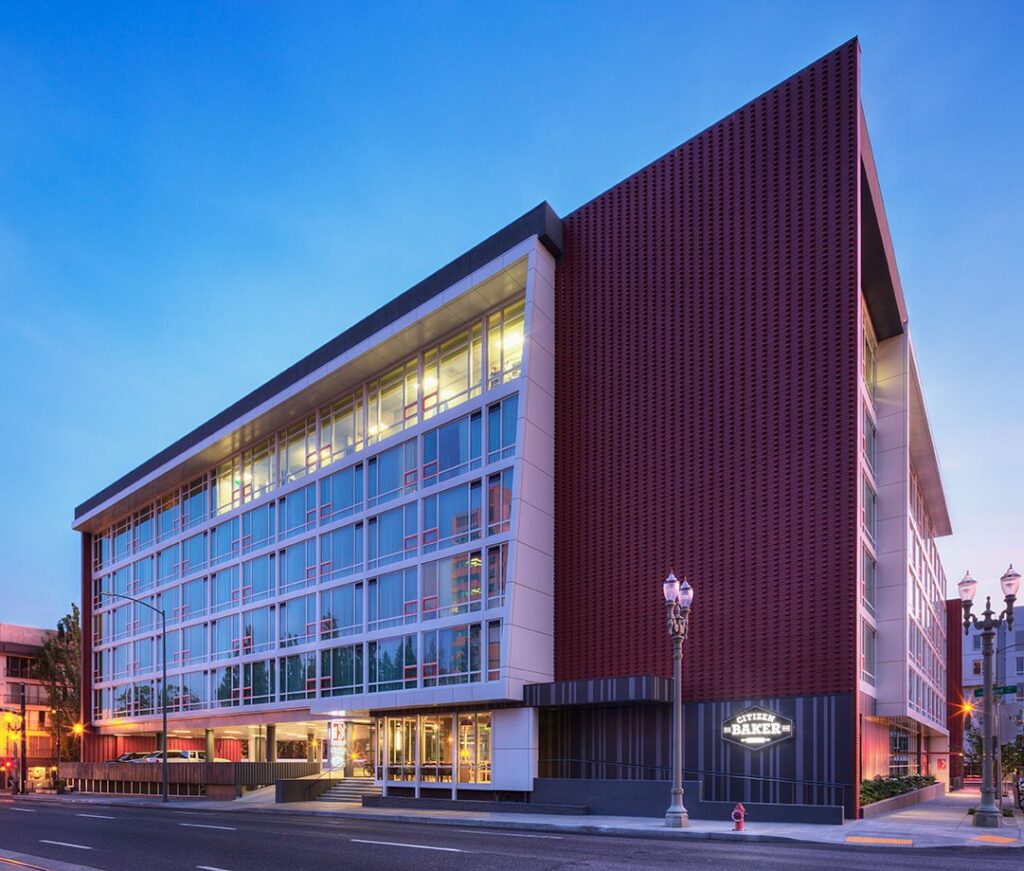

Hotel Availability Update
Our conference hotels now have limited availability and may be sold out on certain nights. If you are unable to secure a room at one of our partner hotels, we encourage you to explore additional lodging options nearby. There are many hotels within walking distance or a short ride from the Oregon Convention Center.
AMERSA has contracted with a 2nd property, the Hotel Eastlund, across the street from the conference venue (Hyatt Regency Portland) to provide overflow rooms at a special rate of only $169/night, excluding taxes. Book by October 1st to reserve the AMERSA rate.
AMERSA’s 2025 conference venue, Hyatt Regency Portland at the Oregon Convention Center, is located just across the river from downtown and is the perfect destination to explore the city’s eclectic neighborhoods from.
We are able to offer an incredible discounted rate of only $199/night, excluding taxes, in order to make the event as accessible as possible for all attendees. Book by October 1st to reserve the AMERSA rate.
CONFERENCE
MERCH
Each year AMERSA offers a commemorative conference pin as an annual fundraiser. This year we are pleased to offer t-shirts as well. All donations are tax deductible and support AMERSA’s mission. Don’t miss out on this AMERSA tradition!
The 2025 Conference Pin and T-shirt designs evoke the AMERSA community’s ongoing commitment to evidence based care.
Pre-order now! Pins and t-shirts will be available for pick-up at the annual conference or shipped in November 2025.
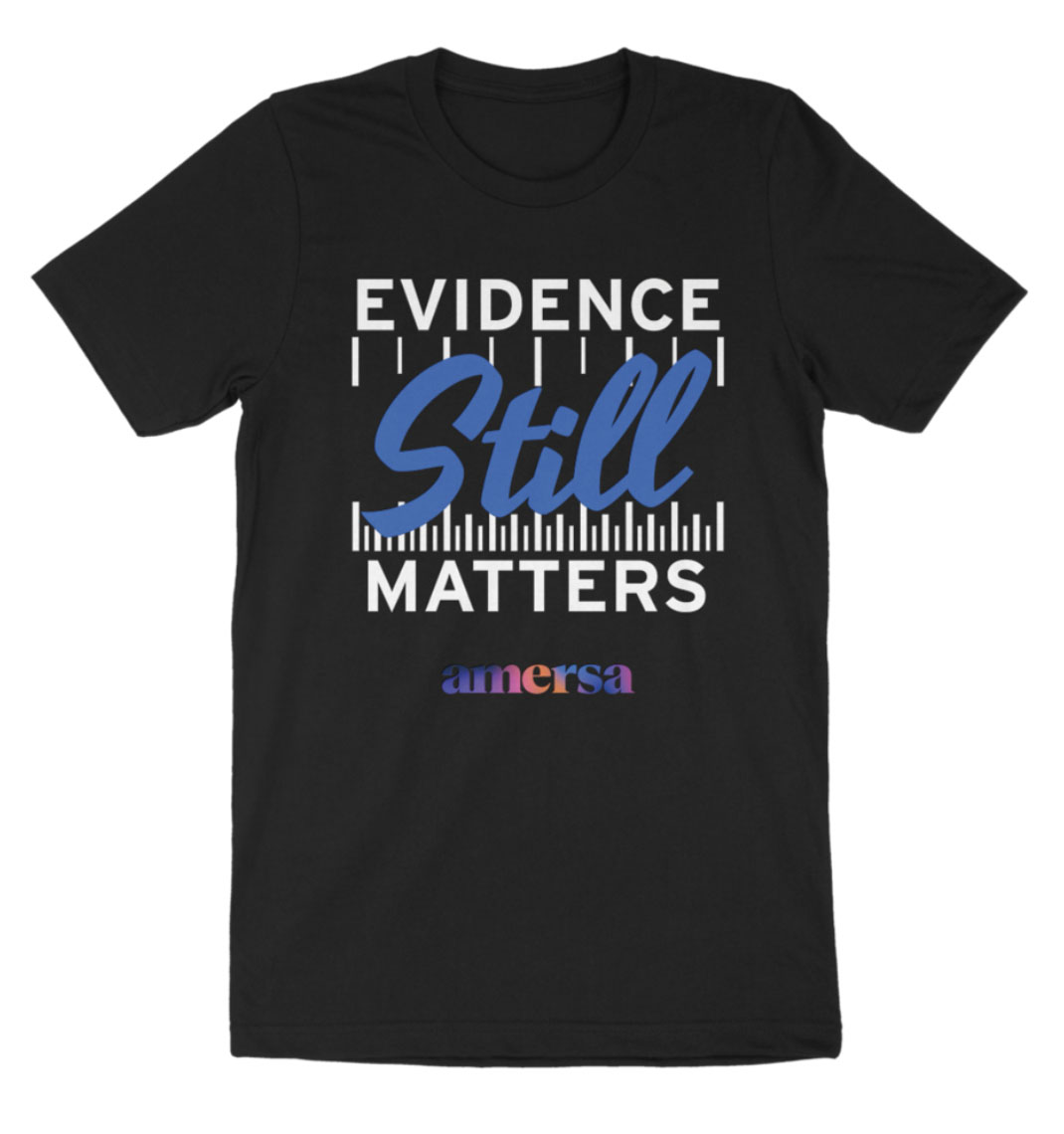
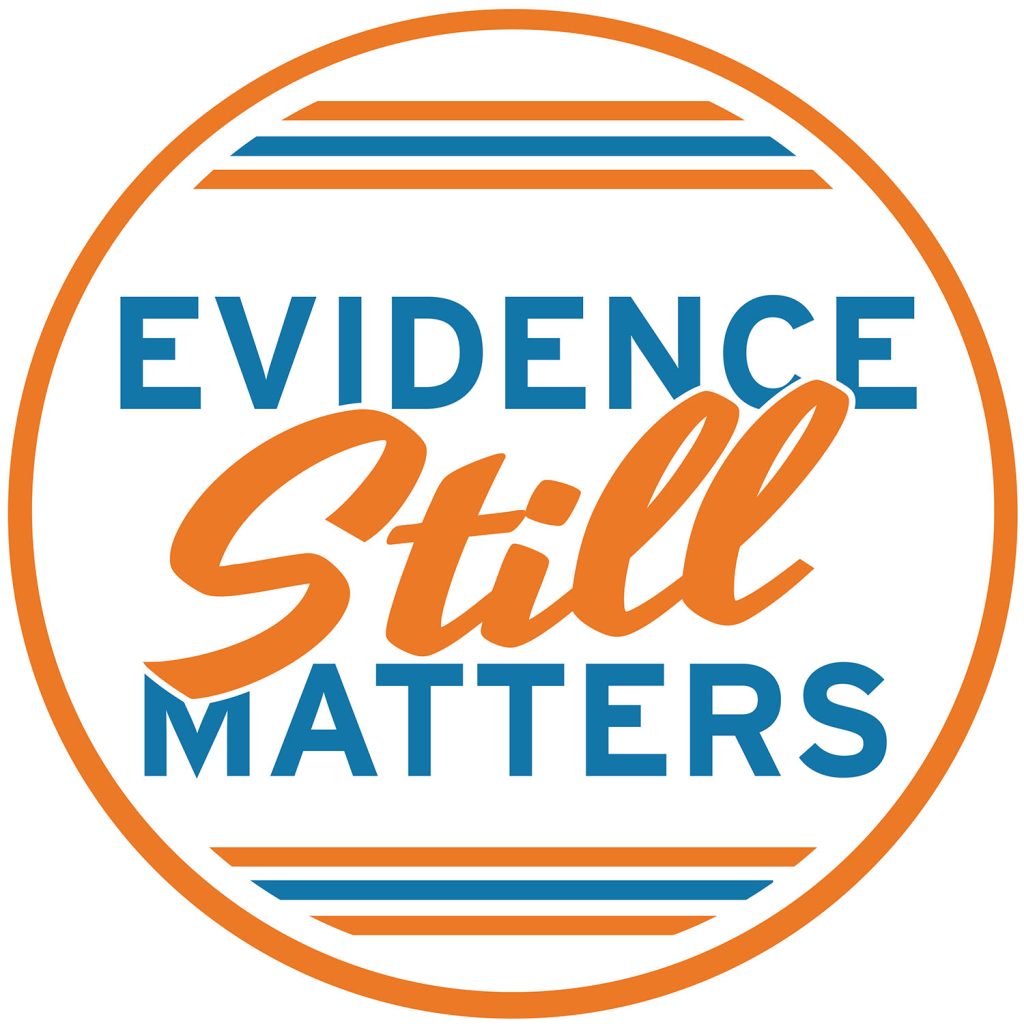
EVENT
SUSTAINABILITY
AMERSA’s Climate Task Force is committed to minimizing the climate impact of our Annual Meeting by:
- Providing access to the conference materials and program through the conference app and QR codes during the meeting, and providing paper packets of conference materials only by request (and for a fee to offset waste, cost and effort to produce packets)
- Providing step-by-step instructions to help members use public transportation to get to the conference hotel after arriving in the meeting city
- Increasing offering of vegetarian and vegan meal options at the conference (reducing consumption of meat has the biggest impact on improving the climate impact of food consumption—even more than eating locally-sourced foods)
- Offering members tips about how to improve their climate impact during their time at the Annual Meeting (e.g., turning off heating/cooling system and lights when they are away from their hotel room; bringing a refillable water bottle or cup with them)
- Contracting with the conference venue to provide alternatives to plastic cups, cutlery and water bottles
- Working with local groups for food donation and composting when available and allowable
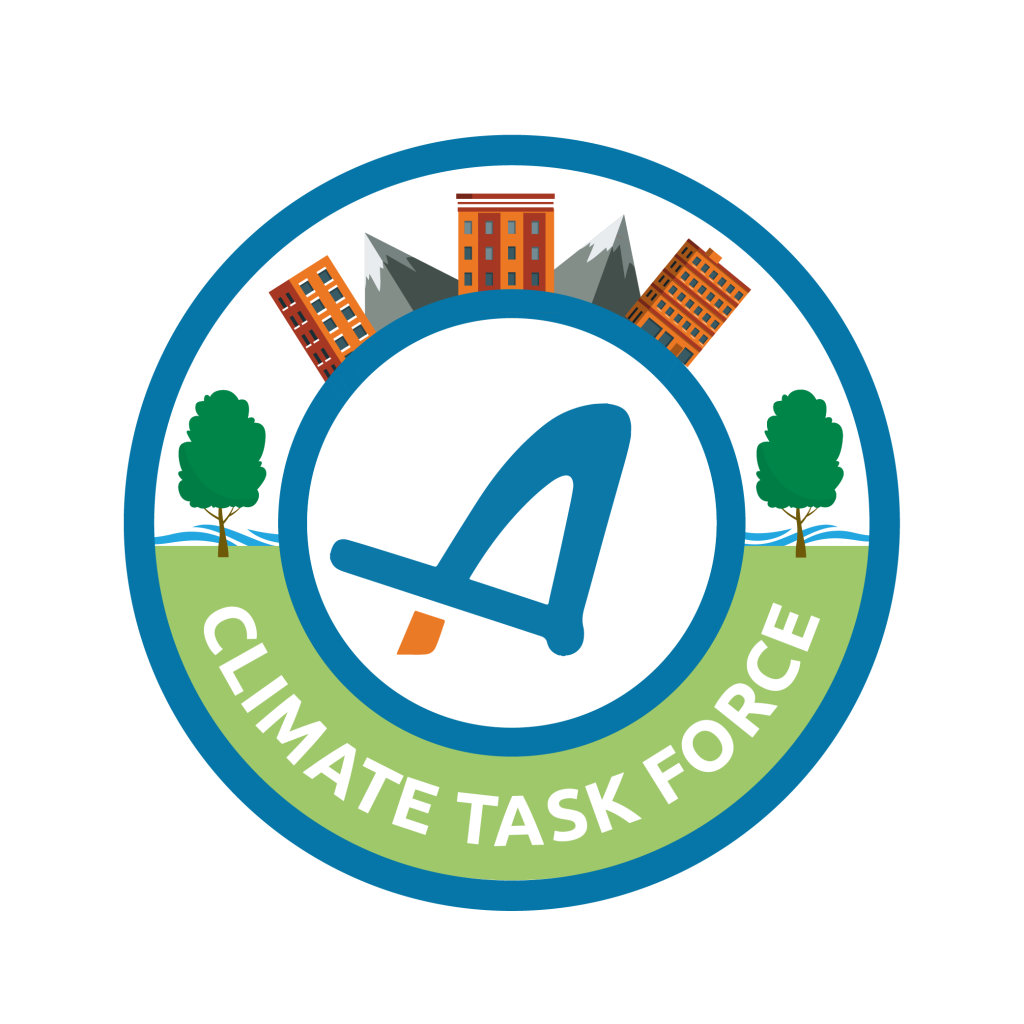
CANCELLATION
POLICY
Cancellation Policy
A full refund will be provided for cancellations requested prior to September 1. A 50% refund will be provided for cancellations requested before October 1. NO refunds will be provided after October 1. Registrations are not transferable between people and can not be applied to future conferences.
Notice of registration cancellation for the conference or pre-conference must be made in writing to kristy@amersa.org.
GUEST
DOSING
Guest Dosing
AMERSA is pleased to assist attendees who need methadone guest dosing in Portland, OR.
There are two locations available:
Downtown Portland Comprehensive Treatment Center
Patient’s counselor should call 503-226-2203 ext. 0 or fax a guest dose form and release of information to 503-226-4231. If faxing, please call and confirm receipt of information.
Questions can be sent to AlderFrontDesk@ctcprograms.com
Fee: $25/day
Payment Methods: Cash or Credit Card (Mastercard or Visa)
Address:
301-375 NW Davis St
Portland, OR 97209
(Approx. 5 minute rideshare or 10 minute bus ride from the hotel)
CODA Portland Recovery Center
Referring clinic must provide the following information by fax (503-239-8406; Attn: CODA Courtesy Dosing) or secure email at CodaCourtesyDosing@codainc.org:
- Referring OTP clinic’s Courtesy (Guest) Dosing Information Sheet
- Signed release of information (ROI)
- Current, signed Physician Orders
- Copy of patient’s photographic identification
- Copy of last 60 days UA
Fees: $65 on the first day (includes $50 set up fee) and $15 for each subsequent day.
All guest dosing patients are required to daily dose, but take home doses are provided for Saturday and Sunday.
Payment Methods: Cash or Credit Card (Mastercard or Visa)
Address:
1030 NE Couch
Portland, OR 97232
(Approx. 5 minute rideshare or 20 minute bus ride from the hotel)
Please contact Rachel McCart at rachel@amersa.org if you need additional details regarding guest dosing at the AMERSA conference.
DEA
REQUIREMENT
DEA Requirement
The AMERSA 49th annual conference is an ACCME accredited activity and can be counted towards the DEA’s new one-time eight-hour training requirement on the treatment and management of patients with opioid or other substance use disorders.
See the official letter to DEA-Registered Practitioners for more details.
Providers renewing their DEA license will check a box attesting they have met the 8-hour training requirement – a certificate of completion is not required at this time.
ACCREDITATION
AND DISCLOSURE
STATEMENT
Accreditation Statement

Read all Accreditation and Designation Statements for AMERSA’s Annual National Conference
Disclosure Statement
Read the 2025 Conference Disclosure Statement
THINGS TO DO
IN PORTLAND
Things to Do In Portland
Whether you have a free afternoon or just an hour between sessions, take time to explore all that Portland has to offer. From scenic gardens and quirky museums to walking tours and cozy cafés, this guide highlights local gems near the hotel—perfect for a quick adventure, a bite to eat, or a deeper dive into the city’s vibrant culture.
Food Carts
Click here for Portland’s Food Cart Finder Tool
Whether you call them food trucks or food carts, they’re flourishing in Portland (and here’s the scoop on the names: “Food truck” is the more common term elsewhere in the country, but Portlanders favor “food cart”). With hundreds throughout the city, food carts are a vital part of Portland’s internationally celebrated culinary scene.
Coffee, Croissants, Chocolate
Start your day together
Start your day at Milo’s City Cafe with a hearty breakfast, or stroll to Twisted Croissant for a flaky chocolate croissant and locally roasted coffee. Craving something sweet and hands-on? Book a 1.5-hour tasting class at Creo Chocolate—go behind the scenes and craft your own dark chocolate bar to take home.
Lan Su Chinese Garden
Tranquility Just a Mile Away
Just a mile from the hotel, Lan Su Chinese Garden offers a peaceful escape in the heart of the city. This authentic Suzhou-style garden features winding paths, koi ponds, ornate pavilions, and a traditional teahouse. Open daily; admission required.
Museums
Interactive Map of Portland’s Museums
Portland is packed with cultural gems—from quirky museums to world-class institutions. Nearby, you’ll find the Starkropolis Pinball Museum and Movie Madness, a mini-museum of rare films and costumes. OMSI offers hands-on science exhibits, a planetarium, and a real submarine tour. Want more? Hop on public transit to explore the Portland Art Museum.
Portland Saturday Market
If you are extending your stay, this is a must-see attraction in Portland
Combining an arts show, a live street concert and an open-air bazaar, this riverside market has been a beloved Portland tradition since 1974. The largest arts-and-crafts fair in the country is open Saturdays and Sundays from March to Christmas Eve.
See Portland Your Way
Pedals, Paths, and Public Transit
Explore the city at your own pace with self-guided walking and bike tours—rentals include everything you need. For a true Portland experience, try the 4T Trail: trail, tram, trolley, and train combine in one unforgettable urban adventure.
Escape Rooms
Want to try something different?
Looking for a fun way to build connection? Try an escape room! Just a short ride from the convention center, these interactive experiences are a great way for mentor–mentee pairs or small groups to collaborate, problem-solve, and share some laughs outside the usual conference setting.
Lloyd Center Ice Rink
A true icebreaker
This unique ice skating rink is located in the bright, open atrium of Lloyd Center Mall, making it a one-of-a-kind spot to unwind and connect. Rent a pair of skates and get out on the ice—it’s a fun, lighthearted way to spend time together. Public skating is available seven days a week, and there’s plenty of nearby seating if you just want to chat and cheer from the sidelines.
Disclaimer: Reference to any specific product, service, process, or method by trade name, trademark, service provider, manufacturer or otherwise on this web site does not constitute an implied or expressed recommendation or endorsement, or favoring by AMERSA, its employees, or officers or members. Certain links on this site lead to information and resources on servers maintained by third parties, and are provided as a convenience to our conference registrants.


